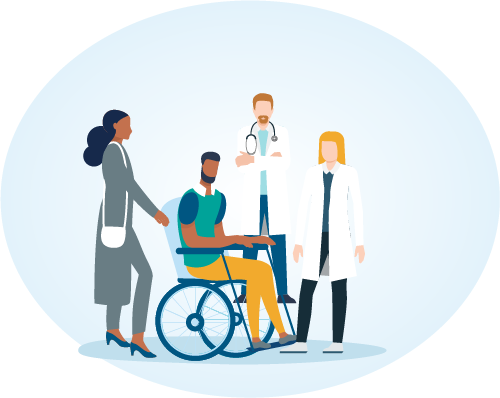Personalized Medicine 101
When it comes to medicine, one size does not fit all. Prevention and treatment strategies that help some can be ineffective or harmful for others.

01 WHAT IS PERSONALIZED MEDICINE?
Personalized medicine is an evolving field in which physicians use diagnostic tests and individual details about a person’s health to determine which medical treatments will work best for each patient, or use medical interventions to alter molecular mechanisms that impact health. By combining data from diagnostic tests with an individual’s medical history, circumstances, and values, health care providers can develop targeted prevention and treatment plans with their patients.
02 WHO DOES PERSONALIZED MEDICINE HELP?
Personalized medicine can guide patients toward prevention and treatment strategies designed to ward off many diseases and conditions, including certain cancers, rare genetic diseases, and some chronic and infectious diseases.

-
Ella was born with cystic fibrosis, a genetic disease which has caused continuing lung infections all her life. When a targeted treatment became available for cystic fibrosis patients with certain genetic mutations (changes in their DNA), she had genetic testing to find out what her mutation is. Fortunately, Ella has been able to benefit from taking this new targeted therapy because it works for someone with her genetic mutation. She now shares information about how personalized medicine can develop new treatments to help others with cystic fibrosis.
-
Terri lives with sickle cell disease, a genetic blood disorder that causes red blood cells to be misshaped. When she was hospitalized in 2012 with a sickle cell crisis, most of the doctors and nurses caring for Terri were not familiar with how to treat the problems caused by sickle cell disease, which can include severe pain, stroke, heart attack, lung failure, kidney failure, blood clots, nerve damage, blindness, and even death. When a treatment becomes available for sickle cell disease, provider education to use personalized medicine will be critically important.
-
Mike’s son, Tony, was diagnosed with SYNGAP1 at 4 years old. SYNGAP1 is a rare genetic disease that causes brain problems and many lifelong challenges, like intellectual disability, seizures, and autism. Even though researchers have not yet found a cure, Mike is grateful he knows the exact cause of Tony’s challenges. Genetic testing helped him find and confirm Tony’s diagnosis. Now, he can stop looking for the cause of Tony’s challenges, and he can access the community of SYNGAP1 families and experts treating SYNGAP1 patients.
-
As a black woman with no guidance on how to manage her diagnosis with colorectal cancer, Candace felt like she was falling through the cracks of the health care system. She now advocates to bring both clinical trials and cancer resources to underserved communities. For health care to be truly personalized, clinical trials must ensure all groups affected by a disease are included. Researchers must also learn how to build trust with underserved and underrepresented communities.
-
After chemotherapy didn’t work to treat Laura’s stage 4 breast cancer, her doctor ordered a biomarker test, which is a test to find errors or changes in a gene’s DNA that cause cancer. Laura and her doctor discussed her biomarker test results and decided together on a targeted treatment, which saved her life. Laura’s discussion with her doctor also led to her family members getting genetic tests to learn if they have a gene that raises their chances of getting cancer.
-
As a treatment for kidney disease, Richard received a kidney transplant 14 years ago. But he worried that his body would reject (attack) his kidney transplant. Now, personalized medicine tests can help watch for signs that his body is rejecting the transplant. Other tests can find genes that raise a patient’s chance of getting kidney disease.
03
How does personalized medicine help patients?
Personalized medicine can involve preventive, diagnostic, or treatment strategies.
Prevention
Preventive personalized medicine is designed to help patients understand their molecular and environmental disease risks.
Diagnosis
Diagnostic tests can uncover the root molecular causes of certain diseases. The results may point to a promising targeted treatment option that would otherwise be overlooked.
Treatment
Personalized medicines can address the root molecular causes of certain diseases. For many patients, molecularly targeted treatment regimens are safer and more effective than one-size-fits-all options.

04 HOW TO GET STARTED
The PMC guide titled How to Access Personalized Medicine is designed to help you advocate for personalized medicine with attention to opportunities in prevention, diagnosis, and treatment.





